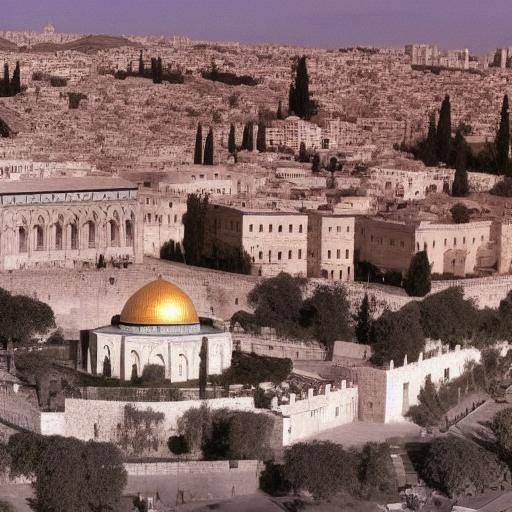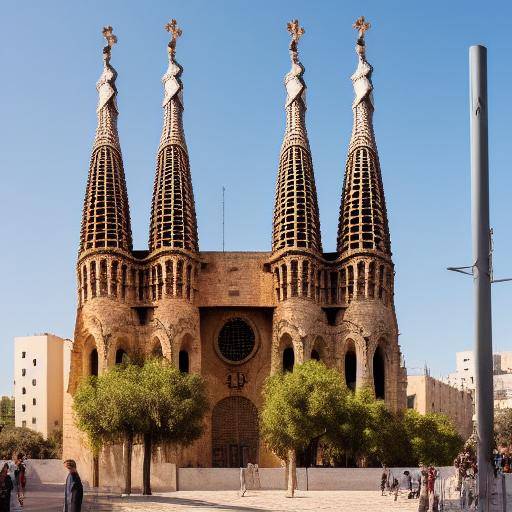
Introduction
From biblical times to modern Jerusalem, the history of this ancient city is a fascinating journey through culture, faith and urban evolution. In this article, we will explore the sacred history of Jerusalem, its historical and religious significance, and its relevance in historical education. From the first settlements to their role in contemporary events, this city has witnessed countless moments that have shaped history. Join us on this journey to discover the mysteries and fascinating evolution of Jerusalem.
Historical context
Origins and transcendence
The history of Jerusalem dates back thousands of years, with roots that go beyond the foundation of many other famous cities today. As the epicenter of the three Abrahamic religions - Judaism, Christianity and Islam - Jerusalem has been witness and center of numerous conflicts, conquests and transformations. The city has been of critical importance to countless civilizations, from the ancient Israelites to the Roman, Byzantine, Arab, Ottoman and British empires, all of which left their mark on their evolution.
Key themes and figures
The significant milestones and historical figures are intertwined with the fabric of Jerusalem. From King David's reign to the construction of Solomon's Temple, the city has witnessed events that have been recorded in the sacred books and the collective memory of millions of people around the world. In addition, illustrious figures such as Jesus Christ, Mohammed, Saladin and Lawrence of Arabia have contributed to his legacy.
Urban developments
The development and urban expansion of Jerusalem over the centuries has been a complex and diverse process. From the labyrinthousand alleys of Old Town to the modern residential neighborhoods, the metropolis has experienced significant changes in its structure and demographics.
Deep analysis
Current benefits and challenges
Today, Jerusalem remains a meeting point for believers, tourists, politicians and academics. Despite its political and social challenges, the city remains an important source of spiritual and cultural inspiration worldwide. This unique status implies both opportunities and challenges in its management and preservation.
Divergent views and views
The rich history of Jerusalem has generated a multiplicity of interpretations and approaches by experts, academics, religious leaders and governments. The perspectives range from considering it as a place of peace and fraternity among religions to a focus of irresolvable political conflict. These different approaches illustrate the complexity of Jerusalem as the object of study and reflection.
Historical educational approach
The importance of Jerusalem as an educational resource to understand the evolution of civilization, religion and conflict is undeniable. Its value in historical education lies in its ability to illustrate multiple chapters of the history of humanity, as well as the interconnections between distant events in time and the ongoing impact today.
Comprehensive review
Applications and good practices
The incorporation of the history of Jerusalem into educational programs brings significant value to the understanding of global cultural and religious roots. Various initiatives at the local and international levels have demonstrated the power of the city as a pedagogical tool to promote tolerance, understanding and intercultural dialogue.
Future prospects and forecasts
The trajectory of Jerusalem as a spiritual, heritage and historical centre projects an immense potential for further promoting multidisciplinary research, collaborative projects and intercultural approaches in the educational field. Their dynamism and relevance continue to generate new opportunities to enrich historical understanding and promote intercultural dialogue in an increasingly globalized world.
Comparative analysis
Jerusalem, sacred history and historical education
Compare the history of Jerusalem with the notion of sacred history and its integration into historical education reveals interesting parallels and contrasts. While Jerusalem embodies a concrete and impactful history in religion and culture, sacred history encompasses mythological, spiritual and ritual narratives of different traditions. Historical education, on the other hand, seeks critical analysis and understanding of historical processes from multiple perspectives, including collective memory and cultural heritage.
Practical advice and recommendations
Effective strategies
- Promoting interdisciplinary education: Integrate the history of Jerusalem into programs that connect history, geography, religion and other disciplines.
- Promote empathy and dialogue: Use the history of Jerusalem as a basis for activities that foster intercultural understanding and mutual respect.
- Incorporate multimedia resources: Take advantage of audiovisual resources, virtual visits and testimonies to enrich the educational and emotional experience about Jerusalem.
Industry perspectives and expert opinions
Reflections of academic leaders
"The history of Jerusalem is an invaluable treasure to understand the complexity of human history and the dynamics of power, faith and culture that have contributed to forging our present world." - Prof. Elena López, specialist historian in ancient civilizations.
Case studies and real applications
Impact of the teaching of the history of Jerusalem
A recent study in schools in several countries revealed that the inclusion of the history of Jerusalem in the curricula not only enriches historical knowledge, but also promotes tolerance, critical thinking and openness to cultural and religious diversity.
Future trends and predictions
Potential of educational technology
The development of immersive technologies and digital educational platforms offers exciting opportunities to bring Jerusalem's rich history closer to global audiences, allowing a deeper and more personal understanding of its legacy.
Conclusion
The history of Jerusalem is a living witness to the complexity and wealth of human experience. Its role as a source of historical learning, intercultural understanding and the promotion of dialogue remains invaluable in a world that seeks greater understanding and mutual respect. By revealing the mysteries and lessons of Jerusalem, we embark on a journey towards understanding ourselves and those who have forged the world that we live today.
Frequently asked questions
Why is Jerusalem considered a sacred city for multiple religions?
Jerusalem is venerated for being the place where there are important religious sites for Jews, Christians and Muslims, including the Wall of the Sighs, the Church of the Holy Sepulchre and the Dome of the Rock.
What is the importance of Jerusalem in biblical history?
In biblical history, Jerusalem appears as the capital of the kingdom of Israel and Judah, as well as the place of numerous key events described in the Old and New Testament.
How does the history of Jerusalem influence contemporary conflicts?
The rich history of Jerusalem and its role as a religious and political centre has contributed significantly to conflicts and disputes in the Middle East, making it a symbol of global tensions.
Why is it important to study the history of Jerusalem in historical education?
The history of Jerusalem offers a unique understanding of the interrelationship between religion, culture, politics and society over the millennia, making it an invaluable resource to educate about the complexity of human experience and global interconnection.
What is the impact of Jerusalem's history on intercultural understanding?
The history of Jerusalem provides multiple narratives that reflect different world views and cultural traditions, which facilitates intercultural understanding and dialogue among diverse communities.
How can teachers integrate the history of Jerusalem into their lessons?
Teachers can employ varied educational resources, such as books, videos, interactive maps and personal testimonies, to effectively convey the complexity and wealth of Jerusalem's history to their students.
Through this journey through the Biblical history of Jerusalem and its fascinating influence on historical education, it is clear that this ancient city remains an inexhaustible source of knowledge, reflection and understanding. His legacy transcends both the religious and the historical sphere, and continues to inspire generations to explore the intricate network of humanity. May this journey through Jerusalem open doors to new understandings and encourage openness to the multiple dimensions that shape our common history and legacy.

